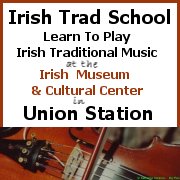Anseo is Ansiúd
I was thinking of a phrase you don’t hear very often in Kansas City.
Assuming you don’t have a television or watch British parliamentary debates on C-SPAN.
It occurred to me that it is odd how the phase “here, here” is a form of appreciation, or congratulation almost, but the phrase “there, there” is one of comfort or commiseration.
And because it made me smile I thought I’d share it with you. But of course I was wrong. Not about the smiling - I really did smile - but about the spelling and a nuance.
“Here, here” isn’t “here, here”. Nope, it’s “hear, hear”. The original form of this expression was “hear him”, because it was usually repeated. And he wasn’t originally a woman.
It was done to call attention to a speaker, and because we’re talking about English politicians and not Irish politicians, it naturally developed the sense of a general expression of favour.
According to the Oxford English Dictionary about a hundred years or so ago hear, hear “is now the regular form of cheering in the House of Commons, and expresses, according to intonation, admiration, acquiescence, indignation, derision, etc.”
So it means exactly what it sounds like it means - the word “Hear” said twice. And it tends to be used in a positive way, but is doesn’t have to be.
In that respect it’s not a million miles away from the Irish language Éistigí, which is a plural imperative meaning “Will yehs all stop talkin’ and listen for a moment” except in Dublin where it means “Attention, there’s a vagina”
Anseo : Here
Ansiúd : There
See Also:
• turas : trip
• Guns and Americans, and the English
• A Kansas City Phone Call to an Irish Bank
• Leaves Changing Colour
• Irish Prison Interview With Philo
• Dublin Slanging Match

 Eolaí gan Fhéile:
Eolaí gan Fhéile:











Down here Ozarks way, we just say “Here”. It’s usually used to break up an argument, settle someone down or to show opposition to a comment. It’s said in a low, growly, rednecky voice and it’s prolonged: “Heeeerrre!” or “Heeeerrre, now!” Pure class!